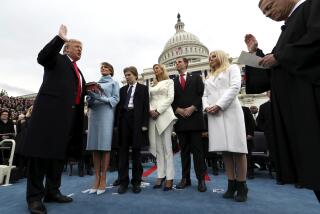Faith behind bars
- Share via
The U.S. Bureau of Prisons has learned an important lesson: Hell hath no fury like religious Americans who believe that even -- or perhaps especially -- convicted criminals are entitled to practice their faith. After an ecumenical protest, the bureau announced this week that it was reversing a decision to remove a wide variety of religious books from prison chaplains’ shelves. But the suspension of the so-called Standardized Chapel Library Project also teaches a lesson to advocates of an extreme vision of the separation of church and state. The reality is that religion and government must interact in some situations, including the provision of religious services for prisoners, students at state colleges and the U.S. military.
The problem with the project was that in negotiating the complicated relationship between private faith and public administration, the Bureau of Prisons didn’t give enough weight to the role that law and tradition have assigned to those who minister to prisoners. Long before the phrase “faith-based initiative” formed on George W. Bush’s lips, prisons tended to the spiritual needs of their inmates -- partly as a corporal work of mercy, partly in the hope that religiously inspired repentance would encourage rehabilitation. Even when dealing with the worst of the worst in their populations, prisons have made special provision for religion.
Last year, the Supreme Court upheld a program at a federal prison in Pennsylvania that denied reading materials, including newspapers, to “dangerous and recalcitrant” inmates in a long-term segregation unit. But, as Justice Stephen G. Breyer pointed out in his majority opinion, even this hardest of hard-line policies made an exception for “religious and legal materials.” Hard-core inmates were denied access to the news but not to the Good News.
The Standardized Chapel Library Project was a departure from this tradition of accommodation for religion. Like so many misguided policies, it had its origins in the post-Sept. 11 war on terror. After a Justice Department report in 2004 warned that some Muslim materials in prison libraries might encourage violence, the bureau decided that prison chaplains could stock their libraries only with works appearing on an approved list. Other books would have to be removed.
In classic bureaucratic fashion, the shelves were cleared not just of materials that might inflame political passions but also of less problematic titles, including Muslim, Christian and Jewish works. Believers rose as one to condemn the policy; the American Civil Liberties Union chimed in, and Republican members of the House of Representatives told Bureau of Prisons Director Harley G. Lappin in a letter that “we must ensure that in America, the federal government is not the undue arbiter of what may or may not be read by our citizens.”
In reversing its policy, the bureau has reserved the right to remove religious books that it believes will incite violence or encourage radicalism, a qualification that would apply not just to writings of Muslim jihadists but also to a Christian-oriented tract by a violent anti-abortion organization. That’s a sensible policy faithful to American traditions of religious liberty.
More to Read
Sign up for Essential California
The most important California stories and recommendations in your inbox every morning.
You may occasionally receive promotional content from the Los Angeles Times.













